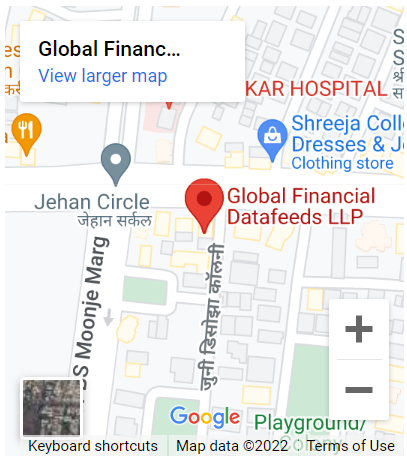GetHistoryGreeks : Returns historical greeks data
Supported parameters
| Exchange | String value like NFO | Name of supported exchange. |
| InstrumentIdentifier | String value of instrument identifier | How to get list of available instruments and identifiers you can find here |
| From | Numerical value of UNIX Timestamp like ‘1388534400’ (01-01-2014 0:0:0) | Optional parameter. It means starting timestamp for called historical data. This value is expressed as no. of seconds since Epoch time (i.e. 1st January 1970). Also known as Unix Time. Please Visit Epoch Converter to get formulae to convert human readable time to Epoch and vice versa (scroll to end of their home page) |
| To | Numerical value of UNIX Timestamp like ‘1412121600’ (10-01-2014 0:0:0) | Optional parameter. It means ending timestamp for called historical data. This value is expressed as no. of seconds since Epoch time (i.e. 1st January 1970). Also known as Unix Time. Please Visit Epoch Converter to get formulae to convert human readable time to Epoch and vice versa (scroll to end of their home page) |
| Max | Numerical value. Default = 0 (means all available data) | Optional parameter. It limits returned data. If Max = N, N records will be received in the response. |
| userTag | Any string value | Optional parameter. It will be returned with historical data. |
| isShortIdentifier | [true]/[false], default = [false] | Optional parameter. By default function will use long instrument identifier format. Functions will use short instrument identifier format if set as [true]. Example of ShortIdentifiers are NIFTY25MAR21FUT, RELIANCE25MAR21FUT, NIFTY28NOV2426050CE, etc. |
What is returned ?
| Token, Timestamp, IV, Delta, Theta, Vega, Gamma, IVVwap, Vanna, Charm, Speed, Zomma, Color, Volga, Veta, ThetaGammaRatio, ThetaVegaRatio, DTR. |
| LastTradeTime : This value is expressed as no. of seconds since Epoch time (i.e. 1st January 1970). Also known as Unix Time. Please Visit Epoch Converter to get formulae to convert human readable time to Epoch and vice versa (scroll to end of their home page) |
Sample request(JavaScript)
{
MessageType: "GetHistoryGreeks",
Exchange: "NFO",
InstrumentIdentifier: "NIFTY28NOV2426050CE",
isShortIdentifier: "TRUE",
Max: 5
};
var message = JSON.stringify(request);
websocket.send(message);
Example of returned data in JSON format
RESPONSE: {"Request":{"Exchange":"NFO","InstrumentIdentifier":"NIFTY28NOV2426050CE","IsShortIdentifier":true,"From":0,"To":0,"Max":5,"UserTag":null,"MessageType":"GetHistoryGreeks"},"Result":[{"Token":"48093","Timestamp":1731999380,"IV":0.22,"Delta":0.01,"Theta":-0.77,"Vega":0.66,"Gamma":0.0,"IVVwap":0.22,"Vanna":0.0,"Charm":-0.0,"Speed":0.0,"Zomma":0.0,"Color":-0.0,"Volga":0.2,"Veta":-0.23,"ThetaGammaRatio":-38028.19,"ThetaVegaRatio":-1.17,"DTR":-0.01},{"Token":"48093","Timestamp":1731999294,"IV":0.22,"Delta":0.01,"Theta":-0.79,"Vega":0.68,"Gamma":0.0,"IVVwap":0.22,"Vanna":0.0,"Charm":-0.0,"Speed":0.0,"Zomma":0.0,"Color":-0.0,"Volga":0.21,"Veta":-0.24,"ThetaGammaRatio":-38031.55,"ThetaVegaRatio":-1.17,"DTR":-0.01},{"Token":"48093","Timestamp":1731999290,"IV":0.22,"Delta":0.01,"Theta":-0.79,"Vega":0.68,"Gamma":0.0,"IVVwap":0.22,"Vanna":0.0,"Charm":-0.0,"Speed":0.0,"Zomma":0.0,"Color":-0.0,"Volga":0.21,"Veta":-0.24,"ThetaGammaRatio":-38030.77,"ThetaVegaRatio":-1.17,"DTR":-0.01},{"Token":"48093","Timestamp":1731999209,"IV":0.22,"Delta":0.01,"Theta":-0.79,"Vega":0.68,"Gamma":0.0,"IVVwap":0.22,"Vanna":0.0,"Charm":-0.0,"Speed":0.0,"Zomma":0.0,"Color":-0.0,"Volga":0.21,"Veta":-0.24,"ThetaGammaRatio":-37929.38,"ThetaVegaRatio":-1.16,"DTR":-0.01},{"Token":"48093","Timestamp":1731998888,"IV":0.22,"Delta":0.01,"Theta":-0.81,"Vega":0.7,"Gamma":0.0,"IVVwap":0.22,"Vanna":0.0,"Charm":-0.0,"Speed":0.0,"Zomma":0.0,"Color":-0.0,"Volga":0.21,"Veta":-0.24,"ThetaGammaRatio":-37791.3,"ThetaVegaRatio":-1.16,"DTR":-0.01}],"MessageType":"HistoryGreeksResult"}


